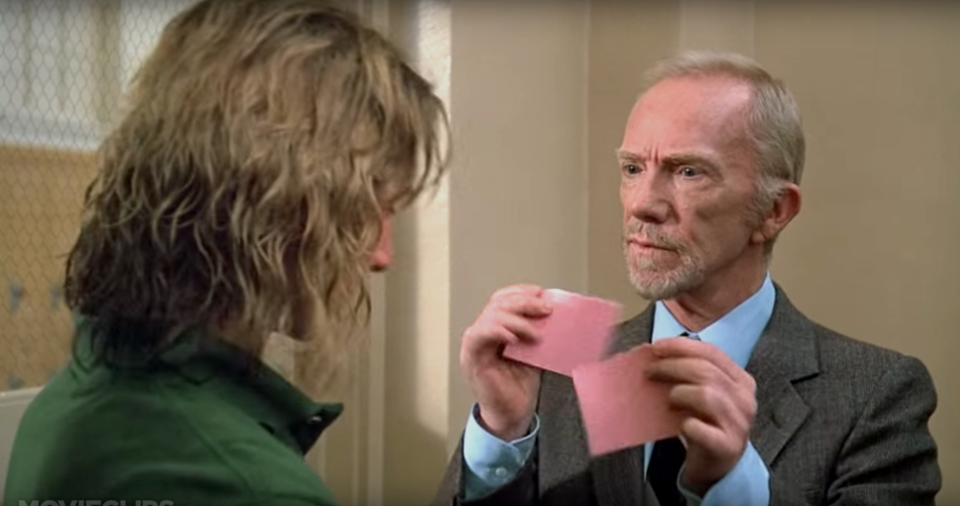The world's top grammarian fears that this punctuation error is becoming standard English

YouTube/Movieclips
Does this sentence read OK to you?
It's the way I'm wired, I'm not about to change.
If you said no, you're right. It's a kind of run-on sentence or "run-together sentence." It's an example of a comma splice.
That's when you join two sentences with a comma. And that's wrong, at least in standard English. Each of those two independent clauses can stand alone because each has a subject and a verb:
It's the way I'm wired.
I'm not about to change.
In standard English, instead of using a comma to join those two sentences, it's better to use a semicolon or an em-dash — or to break up the run-on sentence into two separate sentences.
The semicolon version:
It's the way I'm wired; I'm not about to change.
The em-dash version:
It's the way I'm wired — I'm not about to change.
The two-sentence version:
It's the way I'm wired. I'm not about to change.
Another option is to add "and" to the original sentence:
It's the way I'm wired, and I'm not about to change.
Comma splices may not seem like a big deal, but they are, and they are increasingly so.
They can create confusion for readers. As Bryan A. Garner points out, they can create "miscues." But even when they don't, some readers are likely to object all the same.
And if there's a comma splice in your résumé, cover letter, or formal email, careful readers will see that you don't know how to use a comma correctly.
But don't take my word for it. Take Garner's.
He is the authority on English grammar, style, and usage, and he told Business Insider recently that the comma splice was one of the most egregious errors he has been seeing gaining ground in English.
"More and more people are communicating with comma splices — perhaps in text messages and in email messages — and it could be that comma splices will soon be somehow considered standard," Garner said.

YouTube/Movieclips"I don’t think so — I would say over my dead body," he said. "But one is seeing more and more of these all the time."
It's important to note that professional writers sometimes use comma splices for literary effect, so you might see them in novels, essays, and the like. But note how carefully those comma splices are used in prose of that kind.
As Ben Yagoda has pointed out, Irish author Samuel Beckett was known for using comma splices:
I don't know, I'll never know, in the silence you don't know, you must go on, I can't go on, I'll go on.
He adds, via The New York Times, that there are situations that seem to bring out comma splices:
The first is in quotations:
"The way they've been playing, the team will be lucky to survive the first round," the coach said, "I'm just hoping someone gets a hot hand."
The comma after "said" has to be replaced with a period.
The other issue is the word "however," which more and more people seem to want to use as a conjunction, comparable to "but" or "yet." So they will write something like:
The weather is great today, however it's supposed to rain tomorrow.
That may be acceptable someday. Today, however, it's a comma splice. Correct punctuation could be:
The weather is great today, but it's supposed to rain tomorrow.
Or
The weather is great today. However, it's supposed to rain tomorrow.
As for deciding which punctuation to use — semicolons, em-dashes, etc. — Yagoda offers good advice:
"By reading aloud — always the best single piece of writing advice — and choosing the version that best suits the context, your style, and your ear," he says.
Garner also talked to Business Insider about troublesome phrases, including "beg the question," "home in on," and "between you and me."
Read the full interview with Garner here.
NOW WATCH: A résumé expert reveals what a perfect résumé looks like
See Also:

 Yahoo Finance
Yahoo Finance 
